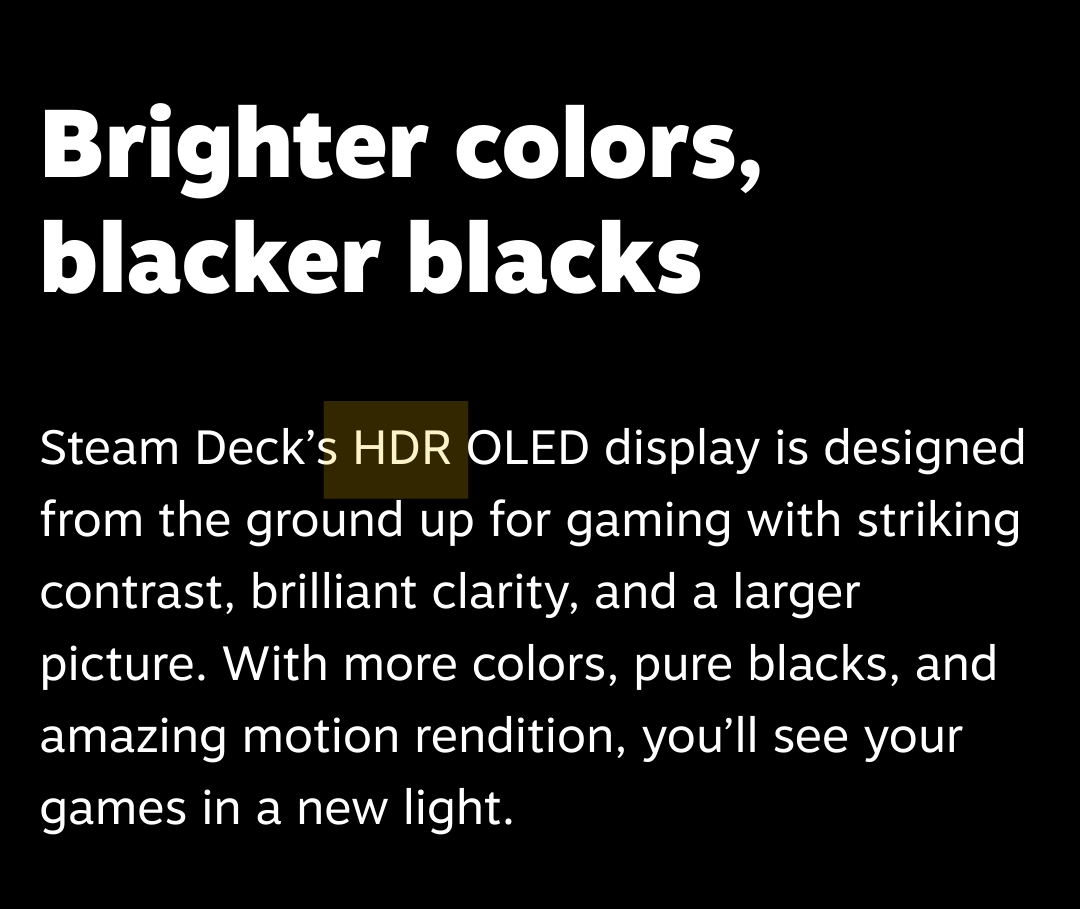I have never used an HDR display before so I’m not sure how it’s supposed to look.
I have been playing Spider-man both with and without HDR and unless I’m staring right into the sun there is literally no difference. I have always heard people talk about HDR as something incredible but I’m honestly disappointed.
I also played Tetris effect: connected and HDR seemed to just make all the menus darker, but the rest looked the same.
Have I done something wrong or is this how it is supposed to be?
HDR stands for high dynamic range. It means you can have detail in shadows and highlights without losing detail in the middle.
At the end of the day, it’s just how your computer or console talks to the display. It doesn’t change what your display is capable of. It can’t magically make colors more vibrant, for example. What it does instead, with a quality display, is allow you to make specific colors more vibrant while keeping their detail, without losing it elsewhere. It should usually be subtle, except in specific showcases designed to push the edges of what HDR can do.
It also doesn’t make a mediocre display not mediocre. If it can’t accurately present the whole range, receiving it doesn’t help a lot.
Edit: oh, didn’t realize this is the steam deck sub. You probably can get actual feedback on the quality of the display, then. But it will still really only make a difference to quality if the developers made a specific effort to utilize it. Realistically, that’s mostly on high quality lighting the steam deck can’t really do.
Yeah, the difference should be easily visible assuming one has quality source material and a nice display. I was kind of assuming OP was talking about using the Steam Deck in docked mode, but maybe that was a bad assumption.
Sorry I should have been more clear. I’m using the steam deck oled with the regular display, not an external display.
deleted by creator
Someone else said the actual OLED doesn’t support it. I never paid attention because I talked myself out of needing one, but if that’s the case you obviously wouldn’t see it on the deck screen.
I think you’d run into the limitations of render quality for most stuff 3D, though. There might be 2D games that play with it, and I’m guessing there are demo videos. I know my first (non-HDR) OLED I enjoyed trying some OLED demo clips out to really see what it could do.
The oled deck does support hdr, dont know why some people are claiming ut doesn’t.
General HDR is not supported in Linux yet though, only in games. So videos are unfortunately not a thing I can use for comparison.
The ability to display HDR mapping and actually being HDR are two different things which leads to this confusion a lot.
The Steam Deck (OLED) can display HDR, but it itself is not “true” HDR, essentially due to the nit output of the screen.
This is why things often look weird with HDR (in general on non-HDR monitors) - it suggests there’s the capability of showing the HDR mapping but there is no support from the display to make sense of the mapping. This is when things look washed out or have a soft of halo shimmering effect.
From my understanding, the OLED is able to display HDR content mapping natively, but itself is not true HDR (basically due to not being bright enough). An example of this in action would be Spider-Man OLED Native (1), Spider-Man OLED Docked with a true HDR display (2), with Spider-Man non-oled HDR on (3) (if possible) and HDR off (4) for reference.
With 1), you see the Steam Deck’s ability to display HDR
With 2), you see the displays ability to display HDR
With 3), you see what HDR looks like on a non HDR display
With 4) you see what HDR looks like on a HDR display
Basically, the Steam Deck screen can display HDR content but isn’t true HDR because it caps out at 1,000 nits. External displays supporting HDR can take advantage of it, and generally even HDR-lite still “looks good”. There’s a number of monitor manufacturers that claim HDR but it’s actually HDR-400. IIRC the Steam Deck is HDR-1000, but true HDR can go all the way to 4,000 nits which is why the Deck isn’t “true” HDR.
This is all just my understanding from information I’ve gathered over time and I’m likely somewhat inaccurate, but I think overall it’s a good guideline that explains the differences.
Hope that clears things up!
To be clear, you’re not going to find many displays that can reach 4,000 nits yet. A lot of HDR content actually is mastered for 1,000 nits and that’s considered kind of the target for the mid-high range OLEDs right now. My pretty much top of the line QD-OLED Samsung S95C maxes out at something like 1350 nits. A 1000 nit capable Steam Deck OLED has plenty of range in luminance for HDR to be effective there. And I’m sure it’s got pretty good color reproduction which is the other big aspect of HDR.
One thing we haven’t talked about is the possibility that the Steam Deck is enhancing SDR content with dynamic tone mapping to such a degree that it’s difficult to tell the difference when you actually enable true HDR. I’d really have to see this with my own eyes to be able to say with more certainty what’s going on.
Good clarification, I did forget to mention that 1000 nits is the standard with many going a bit above
deleted by creator
Thanks for the input. I got confused when people said Tetris effect looked “sooo much better” with HDR and I wasn’t seeing any difference at all.
HDR, from what I loosely understand, is related to the color gamut (the reds, greens, and blues) the display can produce. The sRGB coverage used on most displays today is the BT 709 standard. HDR is the newer DCI-P3 standard, and it covers a wider range of colors.
But that’s why games and systems that don’t support those extra colors won’t give you any extra “oomph” on an HDR display (because it’s only coded to utilize the capabilities of an SDR display).
I recommend this article for further reading: https://tomshardware.com/news/what-is-hdr-monitor,36585.html
HDR is actually the BT.2020 color gamut. Films mastered in HDR typically use DCI-P3 because that’s the standard for theaters, but it’s a smaller color gamut than BT.2020, which is what even HDR10 (the most common form of HDR with the lowest specs) supports.
The article I cited says that modern HDR hardware can’t actually reach BT.2020, though that’s the ultimate goal.
Has that changed?
No, it can’t. Most hardware is targeting DCI-P3 (though some goes beyond it) because that’s what films are targeting in the mastering process, but HDR10 and all other HDR protocols (HDR10+, Dolby Vision, etc) all use the BT.2020 spec on the software side of things.
In other words, the software is ahead of the hardware for now.
I still don’t know how my HDR works or if. I feel like every time it’s enabled it looks weird. Maybe because it’s different, or maybe i’m doing it wrong but it’s to much of a hassle to play with the settings. I feel like on the tv it’s a bit different where i think it looks better.
deleted by creator
Likely you haven’t seen it on a good display. It is quite noticeable and a big improvement on a nice display. HDR 400 is not really HDR and not worth running it in that mode if that’s all your display supports.
deleted by creator
Idk about most people… the difference in black levels is willlld.
Can you describe how you are enabling it? In-game? Are you adjusting it in game after enabling it? Is your deck itself set to full brightness (you obviously won’t get the full 1000 nits if not)
Enabled it in-game. Tried default setting at first then raised the in-game max brightness from 1000 nits to 1200 nits to see if there was a difference but there wasn’t.
I just tried raising the deck brightness and that actually made it look a bit better. I feel kinda dumb now that I didn’t try that before. Still not the amazing difference people made it out to be but i could actually see a little bit of difference now, at least when I look at something bright.
If nothing else it should make the screen a heck of a lot brighter, max brightness is limited to 600 nits with SDR content but goes up to 1000 nits with HDR. For comparison, the LCD deck peaks at around 400, while this is 1400 from a 32" monitor.
Might also require correct HDR settings from the game to work properly? Not sure, don’t have one myself.
I have 2 Samsung HDR televisions and I’ll never buy another one. The image is dark, muddy and unwatchable in HDR. The only fix is disabling it on all connected devices.
Aren’t there different “levels” of HDR? Most cheap TV’s only support HDR10 which basically does nothing. I wouldn’t be surprised if that’s the only quality the Steamdeck supports too. I haven’t checked the specs though.
Edit: Nevermind, this is wrong :)
The new steamdeck oled has a peak brightness of 1000nits so I’m pretty sure its real HDR, and in the games I’ve tried it does look nice.
That’s not what HDR10 means at all, it’s just a different data encoding standard. Like Blu rays vs HDDVDs. A properly encoded HDR10 looks just as bright/dark in a proper monitor
Huh, you’re right. I just looked it up. I was under the impression that there is also an HDR100 and 200 and so on. Thanks for pointing it out!
Ask I correct that to get hdr, you need a game that supports it, the option enabled and a display that supports it? Also the oled deck display does not support it
The OLED Deck does have an HDR screen.
Oh, I didn’t realize and I have one! Now I need to see it in action
Both spider-man and Tetris supports HDR. What do you mean the deck oled display does not support it? Isn’t that the main thing it advertises?
They’re wrong, the OLED Deck definitely has an HDR screen. Not sure why two users in this thread claim it doesn’t.
Sorry I was wrong. I read that somewhere and repeated it, but now I’m corrected and admitting my mistake
I wonder if that means they need to do a better job with their advertising…? Then again, maybe they don’t expect it to be a big selling point on its own.
To be fair though, the first sentence when you bring up the OLED Deck’s product page right after “Introducing Steam Deck OLED” is “A high dynamic range screen, a longer-lasting battery, faster downloads, and much more”. HDR is then mentioned like 5 more times on the product page, so I don’t really get why people miss it.
I mean, I’m buying one in part because of that, but based on the fact that at least a few people are confused about it means it’s reasonable to assume there’s others missing out on this improvement.
The screen on the steam deck isn’t HDR. You can only get HDR from the Steam Deck OLED if you output the display to an HDR display.

OP hadn’t specified that they have an OLED model when I posted this.
Generally if you’re switching HDR on and off and it’s not making any difference, you don’t have an HDR display.
Incorrect, it does have an HDR display. See the product page.
OP hadn’t specified that they have an OLED model when I posted this.
Generally if you’re switching HDR on and off and it’s not making any difference, you don’t have an HDR display.
You wrote that though, which is wrong:
You can only get HDR from the Steam Deck OLED if you output the display to an HDR display.









